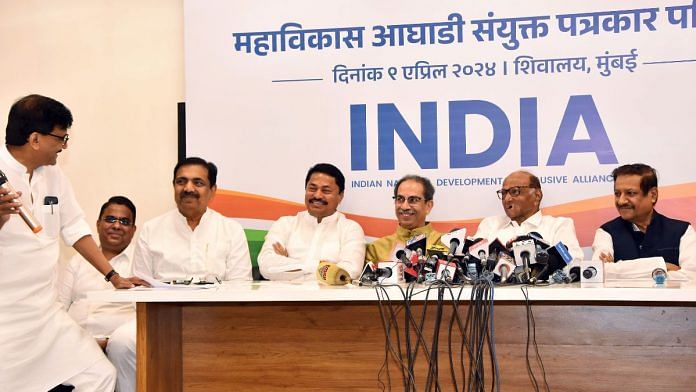Thank you dear subscribers, we are overwhelmed with your response.
Your Turn is a unique section from ThePrint featuring points of view from its subscribers. If you are a subscriber, have a point of view, please send it to us. If not, do subscribe here: https://theprint.in/subscribe/
In its election manifesto, the Indian National Congress (INC), also known as the Congress, has made two significant promises. First, it commits to conducting a nationwide Socio-Economic and Caste Census to enumerate castes and sub-castes, along with their socio-economic conditions. Second, the Congress guarantees that it will pass a constitutional amendment to raise the 50% cap on reservations. This move aims to address the 1992 Indra Sawhney judgment by the Supreme Court, which upheld OBC reservations but set the 50% limit. This entire exercise is done in the name of equitable distribution of opportunities and resources to include all socio-economic groups in power structure and this promise has been campaigned under the name of “Jitni Aabadi Utna Haq”. The Supreme Court’s rationale for the 50% reservation threshold is rooted in Dr. B.R. Ambedkar’s view expressed during the constituent assembly. Dr. Ambedkar suggested that reservation should be limited to a minority of seats, implying that exceeding the 50% threshold would encroach upon majority territory. While not perfect in its current form, I personally concur with this perspective. This Congress party’s proposal represents extreme populism, potentially leading to a continuous increase in reservation quotas by successive governments until it becomes irreversible. This idea has been turned on its head in Lebanon where positions at every level are divided based on religious sects. This has resulted in a weak, corrupt, and patronage-based system. Additionally, it has entrenched existing fault lines and created divisions among different sections of society when it comes to job opportunities. A similar situation can be observed in the South African national cricket team, where race-based quotas have not necessarily led to positive outcomes and have even prompted some White South Africans to seek opportunities in other associate cricketing nations.
Allocating government jobs and educational seats based solely on one identity oversimplifies a complex issue. The popular election slogan “Jitni Aabadi Utna Haq” has made this approach appealing to many young and unemployed individuals. If this concept gains widespread support, it may become difficult to prevent its implementation. This situation aligns with the saying, “Nothing can stop a bad idea whose time has come.” In the recent caste census conducted in 2022 in Bihar, people were grouped into 214 castes and categorized into five groups: forward caste, backward caste, scheduled caste, scheduled tribe, and extremely backward caste. The proposal from this survey by Nitish Kumar is to increase reservation to 65 percent for government jobs, aiming for more equitable distribution. However, it’s important to note that this increase in quota applies to the overall 20.47 lakh jobs in the Bihar state government, and it may not fully address the employment challenges. Implementing this idea could lead to resentment among young people who missed out on opportunities due to quota criteria. Even though all qualified individuals won’t secure available jobs, they may feel that the quota system is the sole reason they didn’t get hired. An unaddressed concern lies in the fact that within the five broad categories, there are numerous castes. Ensuring representation for both categories and sub-categories based on population percentages is a daunting task. Conversely, if job reservations are solely based on these five categories, many castes within the group may be left behind due to inherent socio-economic diversity. Furthermore, this approach could reinforce caste identity across all aspects of life and encourage endogamy. While having an identity tied to caste or any other form is acceptable for most people, when it dictates every aspect of one’s life, it can lead to tribalism and societal fragmentation. The Bihar caste survey cost taxpayers 500 crores, and extrapolating this data to the entire country would result in a cost of around 7000 crores. However, it wouldn’t create new jobs; instead, it would redistribute existing ones. According to data from the Department of Personnel and Training (DoPT), over the last eight years, only 7.22 lakh people received permanent central government jobs, which averages to less than one lakh jobs per year. To maximize taxpayer value, directing funds toward Production Linked Incentive (PLI) schemes, which have generated 7 lakh jobs in just three years, would be a smarter choice. Despite questions about government report credibility, the PLI numbers remain positive compared to spending on a caste census. An additional benefit of PLI jobs is their positive impact on indirect employment, creating a robust ecosystem. In the realm of politics and elections, politicians often prioritize short-term solutions over addressing the root causes of societal issues. While providing jobs and educational opportunities is essential, many community members remain excluded due to qualifications and lack of support systems. The concept of offering high-visibility jobs to historically disadvantaged communities is commendable, but it has sometimes become a mere public relations exercise. To uplift entire communities, we must focus on sustainable solutions that tackle underlying challenges.
These pieces are being published as they have been received – they have not been edited/fact-checked by ThePrint

